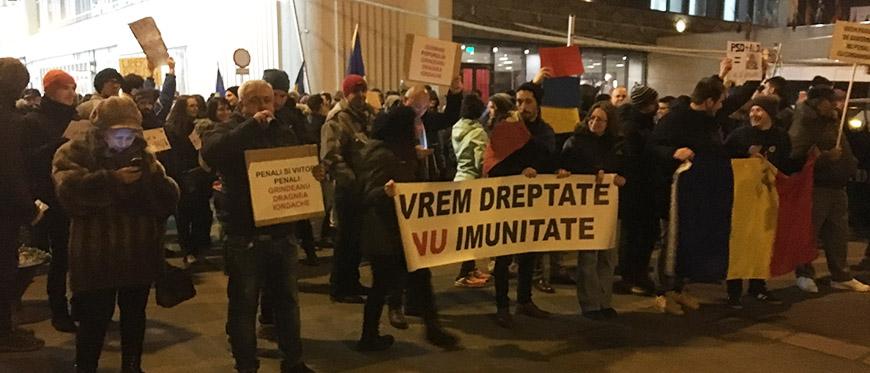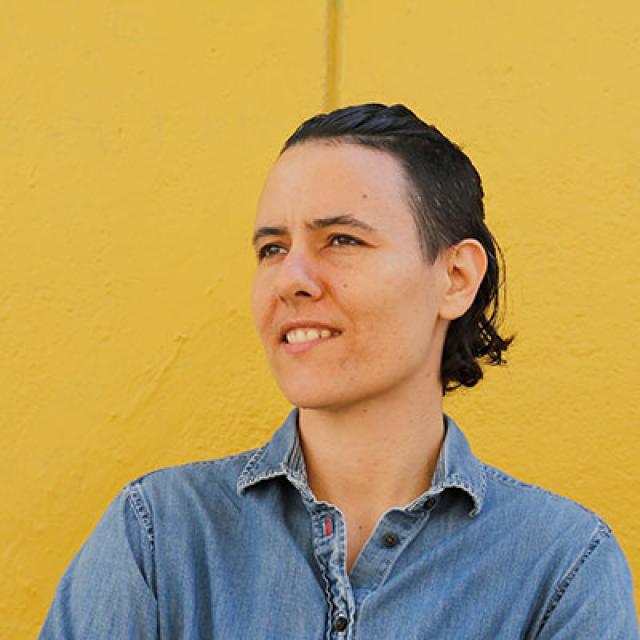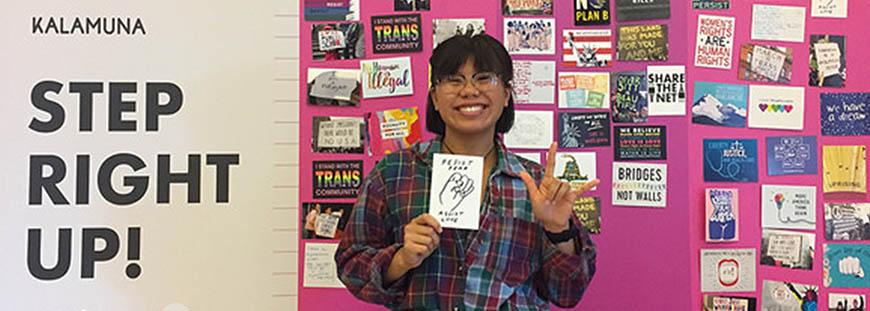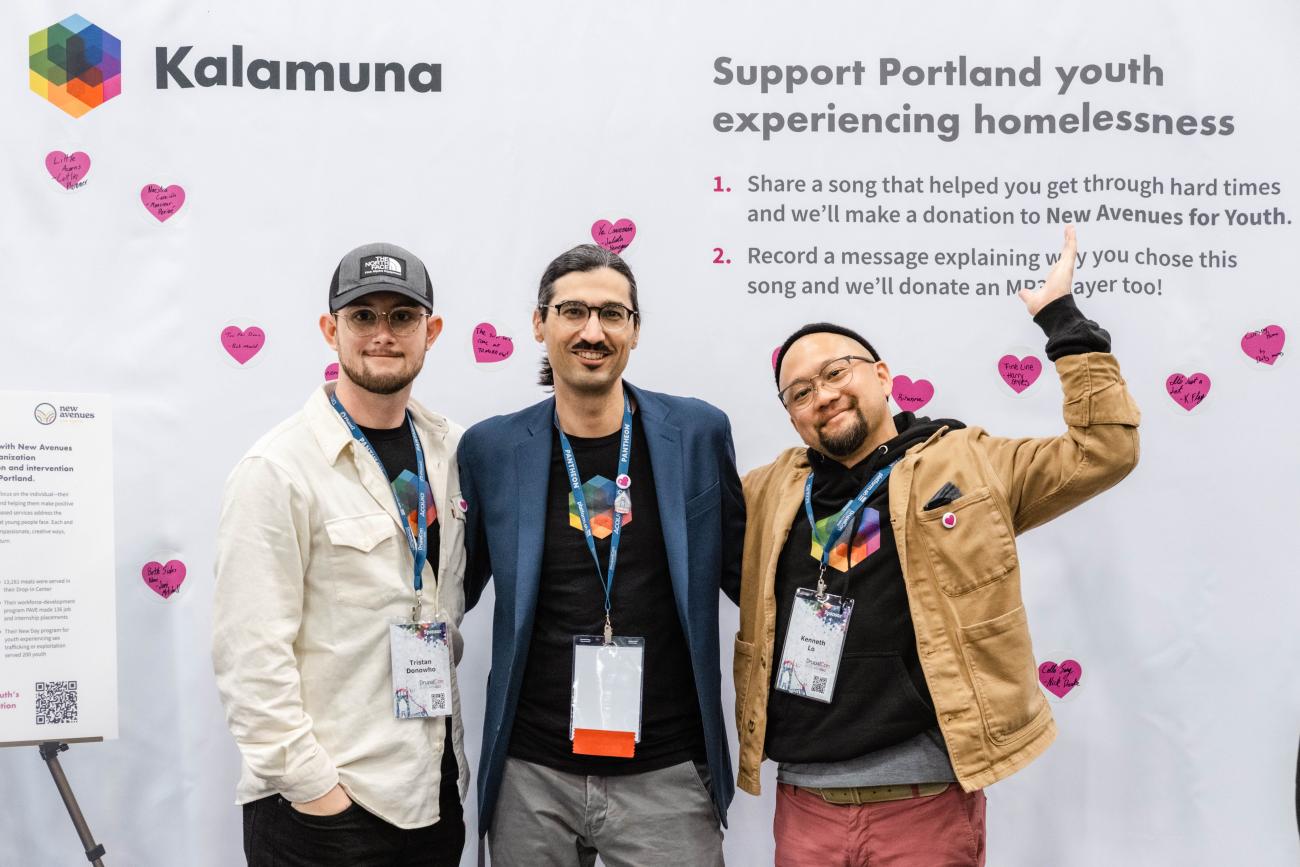
Talking Politics in the Values-Driven Agency
Share
During our agency’s weekly video call, our developer in Romania, Emanuel, showed us images of massive protests in his city’s streets. On a Slack channel, someone else posted an image of Beavis and Butthead’s Beavis alongside Kellyanne Conway. These are just two of several occasions when I’ve thought, “Uh-oh. We’re talking politics. Someone’s going to get pissed and there’s going to be a fight.” So far that hasn’t happened. For me, this sort of workplace commentary isn’t normal; the unspoken rule (it probably was written, somewhere) in my past companies (not mission-driven) was that you did not talk politics. The main reason for this constraint seems obvious: politics can create interpersonal conflicts, jamming up the work-works. So what happens in a quasi-non-political web agency when political discussion becomes normal? Are we fomenting conflict within the team? I asked a few coworkers for their thoughts on what’s going on, knowing that teams outside Kalamuna are probably thinking about the same issue. What follows is an abridged version of my group interview with Sr. Architect Derek DeRaps, Jr. Developer Katy Pool, Front-end Developer Josh Walker and Co-founder Andrew Ward. And of course, the views of the individual team members quoted here don't necessarily reflect the views of Kalamuna.
Our Conversation
Shannon: I’ve noticed we’ve been talking politics more at our Friday team meeting. At other agencies I’ve worked at, this was verboten. What do you guys think about it?
Katy: I feel like it’s the general mood of everything around me. Everything is permeated by what is going on in DC. People are worried about what is coming next. It’s just what you’re going to talk about with the people around you. It’s nice that work is a place where you can get away from it, but it’s harder now to have that separation.
Derek: It’s tricky because we’re all of like minds, it’s easy to share in the workplace. I like it, but maybe if we had someone who is happy with the election, I don’t know that they would feel safe speaking up.
Josh: They wouldn’t last.
Derek: But there are sane people out there who, for whatever reason, voted for the president.
Andrew: Our brand attracts like-minded, mission driven people. Mallis has encouraged me to write a post about our brand and where we are with this politics stuff. We do work on projects that do advance change. I’m not using our organization as soapbox; there’s a lot of that out there. I want us to say: “we’re here to act.”
Josh: I think it’s interesting because I don’t consider myself particularly left-wing. But I don’t think you need to be left-leaning to realize what’s going on. But it is an interesting dynamic in the Friday meetings, where everyone is throwing their opinions around.
Shannon: What if an argument broke out?
Josh: It’s hard, people are passionate. The overwhelming majority agrees with itself, so when new people come in, they might be hesitant.
Katy: There is a difference between political discussion for the sake of talking and opening it to argument and talking about how the political environment is affecting you at an emotional level.
Josh: Right, because you’re just talking about your experience.
Katy: It’s cool to have an open forum to talk about your week. There is a difference between saying “let’s talk about this contentious situation” versus: “here’s how this thing from this week has affected me.”
Andrew: As long as people don’t make it personal. Most people, I think, can separate out the critique of a president or policy from the people who may support that policy. We’re all adults here.
Josh: It’s hard because we can agree to disagree, but when it crosses the line, like when you’re actively promoting hate, there is a line. It stops. We are in that realm.
Katy: I’m obviously not shy about my politics, but I don’t want to get into a confrontation. That is not what I’m looking for when I am expressing those things. It’s interesting: we’re all different people, we live all around the world. Having that open space to talk about our individual experiences, we’re going to talk about things specific to our lives that are very different from others’. But we’ve struck a good balance.
Derek: Everyone is pretty sane. I think we’re all pretty good about that. The question has definitely come up for me before: how would someone feel if they weren’t totally on board with our views?
Katy: We can have those differences, but for me, observing what we have talked about, it’s stayed civil. I’ve never been worried that someone was going to get into a tiff.
Andrew: I’m wondering if people make a distinction between someone who voted for Trump and a Trump supporter.
Katy: Yeah, just because you voted for him doesn’t mean you now support him. This is an extension of how much of your personal politics do you bring into the workplace. Right now is a particularly contentious time. I have been at Kalamuna for three years, and the brand of Kalamuna, the vibe, it’s always been very like, “we are free to talk about these things and it isn’t strictly a professional setting, where you can only have work-related conversations.” Now we’re seeing how that plays out. Politics are heated, they are affecting people’s lives.
Shannon: What does it mean to have a “work-related convo” when you work for a place that espouses certain values out of the gate?
Derek: Does everyone who works at an org have to be totally on board with the values and mission of the company? Probably. I wouldn’t want to be the developer at Chick Fil-A. That’s the question, is it a requirement to work here that you have certain views?
Josh: if you were an extreme capitalist, you’d have a problem working for nonprofits.
Katy: If you‘re apathetic, then...
Josh: ...then, it doesn’t matter either way.
Derek: Some people think their job is their job and they don’t think about what evil they’re doing, so take that the opposite way. For me, what is more important than politics is empathy, but that’s a bottom line core value of mine. It doesn’t mean it’s okay to be racist. For me it’s just a higher core value than the righteousness.
Andrew: I think people who are gonna be “alt-right” or whatever, or bigoted, or have those opinions just…within in Drupal I don’t see them much. The Kalamuna multi-colored logo harkens to the multi-colored rainbow. We have all these signs that say “this is who we are,” so we don’t get approached by people who don’t really mesh. If there were someone who felt uncomfortable, they would not apply or attend the Friday meetings, but I don’t think we’ve seen that.
Shannon: Okay, guys, water cooler sesh is up. We have to make the Internets now.
What Now?
There are no black and white takeaways from our conversation. I still worry that our impromptu political discussions (which have yet to become debates,) whether they’re at the office, over Slack, or during our Friday video calls, will highlight ideological or other differences between us, potentially stirring up enmity and hampering collaboration. But our conversation did articulate the difference between using company time to talk about how world events affect us (and thus, how we may behave among one another) versus using company time to argue for the supremacy of our opinions on those world events.
It may seem like a risky space to create, but, depending on your industry and company culture, it may be worth establishing a short, informal time for your team to share not only work projects, but also what’s going on in other parts of people’s lives. For us, doing so enables the institution we call “the company” to acknowledge a core commonality: the fact that we all experience things outside of work that influence how we behave as a team. In my experience, it’s rare for a company to explicitly acknowledge this fact and take time to tend to it; conversations about “real life” have happened casually, between meetings, and extended company-sponsored social interaction was always billed as the ever-creepy, forced-fun “teambuilding” exercise. “Real life” stuff was relegated into subterranea. I’m grateful to work with a group that makes this time. It helps get all our differences out so we can sooner see the ways in which we are the same.







